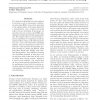109 search results - page 4 / 22 » Policy teaching through reward function learning |
104
Voted
IIE
2007
15 years 1 months ago
2007
We investigate the possibility to apply a known machine learning algorithm of Q-learning in the domain of a Virtual Learning Environment (VLE). It is important in this problem doma...
155
click to vote
AAMAS
2010
Springer
15 years 1 months ago
2010
Springer
Abstract In this paper, we present a human-robot teaching framework that uses "virtual" games as a means for adapting a robot to its user through natural interaction in a...
127
Voted
IJCAI
2007
15 years 3 months ago
2007
Inverse Reinforcement Learning (IRL) is the problem of learning the reward function underlying a Markov Decision Process given the dynamics of the system and the behaviour of an e...
121
Voted
NECO
2010
15 years 5 days ago
2010
Most conventional Policy Gradient Reinforcement Learning (PGRL) algorithms neglect (or do not explicitly make use of) a term in the average reward gradient with respect to the pol...
112
Voted
ICML
2002
IEEE
16 years 2 months ago
2002
IEEE
Two notions of optimality have been explored in previous work on hierarchical reinforcement learning (HRL): hierarchical optimality, or the optimal policy in the space defined by ...

